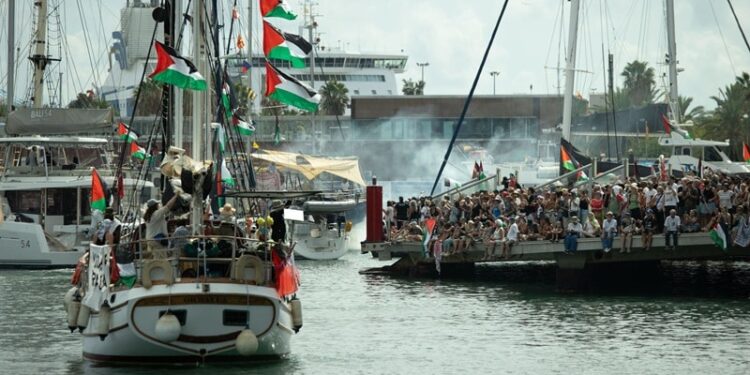On the eve of its departure to Gaza, the Soumoud flotilla, a solidarity initiative with Palestine, is preparing to break the blockade imposed on the Gaza Strip. Mobilizing activists from more than 44 countries, the operation combines humanitarian, logistical and symbolic issues.
The flotilla brings together 23 ships and 72 Tunisian participants, accompanied by Arab volunteers from Algeria, Morocco, Libya, Mauritania, Kuwait and Bahrain.
It is part of the Global Sumud Flotilla, an international initiative which mobilizes several regional branches: the Spanish branch, part of Barcelona, and the Italian branch, planned to join the Tunisian convoy at sea.
The organizers recall that the objective is strictly humanitarian: to transport drugs, foodstuffs and other vital aid to Gaza, while denouncing the Israeli blockade.
According to Khaled Boujemâa, member of the organizing committee, the Soumoud flotilla boats gradually converge on the Marina de Bizerte for departure for Gaza. More than twenty were already present yesterday afternoon. The departure for Gaza is planned, according to him, this Saturday, September 13, subject to favorable weather conditions.
Logistics and successive delays
The preparations were punctuated by delays and obstacles:
The Spanish boats, who arrived on September 7 in Sidi Bou Saïd, was originally to leave the same day. The departure was postponed on September 10, then to Bizerte, due to unfavorable weather conditions and the need to carry out technical checks on certain ships.
Two ships, the Jalila and the Salim, were tried unfit to sail by the Tunisian authorities despite the favorable opinion of experts and mechanics.
Tunisian members of the organizing committee have indicated that postponements are mainly linked to weather and logistical constraints.
Incidents
The flotilla course was marked by two incidents:
The Family Boat, a Portuguese pavilion and the main ship of the Spanish branch, was targeted by a drone on September 8, causing partial fire without making any victims. The Alma, British pavilion, underwent a similar incident the next day.
The organizers accuse Israel of intimidating the participants, but underline that these incidents will not deflect the flotilla of its humanitarian mission.
Donations, transparency and logistics
The funds collected from Tunisian citizens were supervised by a notary and a chartered accountant. A part was used for the purchase and equipment of ships. The balance will be donated to UNRWA to support Palestinian refugees.
Popular solidarity
The flotilla sparked a strong citizen mobilization in Sidi Bou Saïd and Bizerte, with gatherings and donations in favor of the mission. This initiative illustrates the symbolic and diplomatic role of Tunisia, which is to be balanced between popular support for humanitarian and Palestinian causes and geopolitical implications linked to the delivery of aid in a conflict area.
The presence of activists from 44 countries and international public figures reinforces the symbolic and media impact of the mission.








